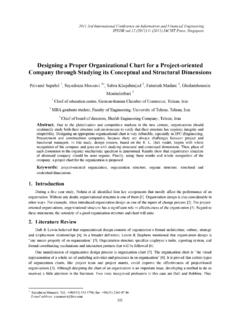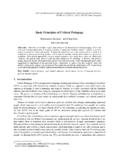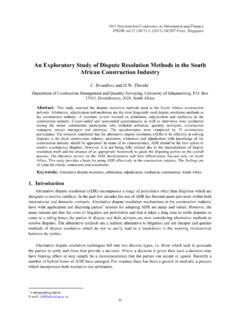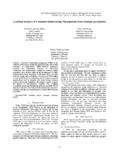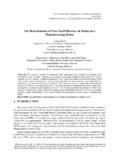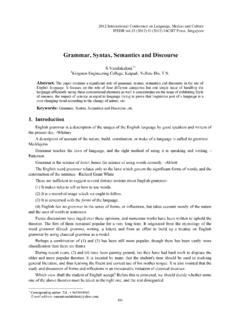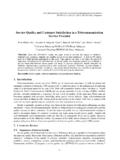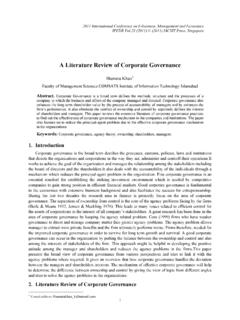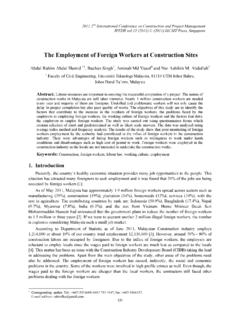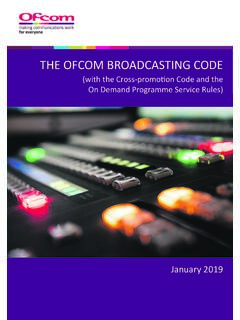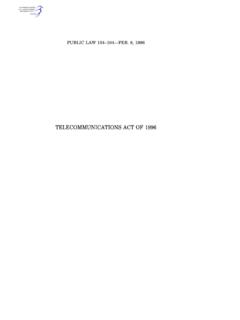Transcription of Nigeria Freedom of Information Act 2011 and it’s ...
1 2011 International Conference on Information and Finance IPEDR ( 2011 ) ( 2011 ) IACSIT Press, Singapore Nigeria Freedom of Information Act 2011 and it's Implication for Records and Office Security Management Ayuba A. Aminu1, Yahaya Y. Malgwi2, Bulama Kagu3 and Ibrahim Danjuma4. 1. Department of Business Management, University of Maiduguri- Nigeria 2. Bursary Department, University of Maiduguri, 3. Department of Education, University of Maiduguri, 4. Faculty of Management and Human Resource Development, Universiti Teknologi, Malaysia Corresponding author: Email: Abstract. The Nigerian Freedom of Information Bill was along awaited bill which was finally signed into law. The paper has two key aims, firstly to review the content of the Freedom of Information Act 2011 , secondly, its implication to records and office security management to administrative managers.
2 The method used in the study was secondary source of data from the Freedom of Information Act 2011 . The findings of the paper state the importance of classified documents, the method of handling and conveyance of classified documents and threats of e-mails Information to office security management. The findings further revealed the protection against public officers and no civil or criminal proceedings shall be made against any government or public institution, or against any person acting on behalf of the government or public institution, and no proceedings should be made against the Federal Government, state or Local Government or any institution. The paper recommends that any Administrative Manager who wants to achieve success in his career must adhere strictly to Information security in line with the Freedom of Information Act and concluded that the Freedom of Information Act has made records or Information in such a way that you must know only what you need to know.
3 Key words: Freedom of Information , Records, Office Security Management: 1. Introduction The long awaited Freedom of Information Bill has gained approval by the National Assembly and assented by Mr. President and thus become a law. The question still is how free is the Freedom of Information Act 2011 and what are its implications on records and office security management? Though the Act is to make public records and Information more freely available, provide for public access to public records and Information , project public records and Information to the extent consistent with the public interest and the protection of personal privacy. It also protects serving public affairs from adverse consequences for disclosing certain kinds of official Information without authorization and establishes procedures for the achievement of those purpose and related purpose thereof.
4 The Freedom of Information Act made it clear on how Information records can be obtained such as right to access records, application for access to records due to refusal by Head of Government to public institution to disclose records. The Act further spelled out ways of getting access to record by court, materials exempted and documents under the security classification. The statement of the problem is that, the Freedom of the Press is an essential ingredient for democracy;. the laws governing the press in democratic countries are those which seek only to protect the fundamental rights of individuals and ensure the maintenance of peace and order. There is hardly any country in the world where there is no Press law even though in most developing countries including Nigeria does not enjoy a high degree of press Freedom .
5 This is due to the fact the ruling elite is always passing obnoxious laws which 78. seek to protect the selfish interest of those in power (Momoh 2002). However, Press laws are legislations made by the government in power at the Federal, State and Local Government levels to control or regulate the activities of the Press in their country. The Nigerian press haven succeeded in enacting the Freedom of Information bill into law, the major concern of this paper is to examine the implications of the Act on effective records and office security management. To this end, the objective of this paper is to critically review the content of the Nigerian Freedom of Information Act 2011 with the view to assessing its implication for records and office security management.
6 2. METHODOLOGY. The paper began with the exploratory study on the content of Freedom of Information Act 2011 . The paper was a survey research and the data was collected mainly from secondary sources derived from reviewing conceptual framework on the issue of press Freedom in the Freedom of Information Act regarding requesting, issuing and receiving Information from government or public institution and content analysis was in analyzing the data. The need for press Freedom Onagoruwa (1985) defines Press Freedom as the right of the press to publish without being subjected to intimidation, threat, molestation or blackmail. While Alabi (2003) sated that, Press Freedom simply means that the press should be allowed to publish without prior restraint.
7 In this situation, Press should be free to publish or broadcast whatever it deems fit to the public without harassment. Press Freedom is an essential ingredient of democratic culture and the higher the degree of press Freedom allowed in any country, the better the degree of democracy its citizens enjoy as gain of democracy and Freedom of expression. Evolution of Press Freedom in Nigeria The first newspaper in Nigeria was established in 1859 called Iwe Irohin, The paper existed from 1859 to 1867 and subsequently some newspapers begun to appeared in the late 1880s. In the early 1900s, the British Colonial Government started feeling uncomfortable with the press and started enacting laws that were harsh for the operation of the press and finding ways of checking the excesses of the press especially towards the colonial administration.
8 Omu (1978) stated that, the heightened tone of press criticism which marked political opposition from the last days of the nineteenth century to the eve of the First World War could not but irritate the colonial administration . In view of the situation, the colonial government enacted a law called the Newspaper Ordinance of 1903 followed by Seditious Offences Ordinance of 1909 etc. However, the Nigerian Press began to struggle for press Freedom as rightly observed that most of the press laws enacted in Nigeria from colonial times were obnoxious impositions by those in power to protect themselves from the legitimate searchlight of a dutiful and patriotic press. Incidentally, the struggle for press Freedom in Nigeria was tied to the struggle for political independence.
9 The early newspapers used their editorials and columns to crusade relentlessly for political independence. According to Daramola (2003), as far back as 1881, when the Colony of Lagos was being administered from Sierra-Leon, the struggle for independence from colonial masters had started to appear in newspaper editorials. For example, the Lagos Times and Gold Coast Colony Advertiser of March 9, 1881 stated: We are not clamouring for immediate independence, but it should always be borne in mind that the present order of things will not last for ever. A time will come when the colonies on the West Coast will be left to regulate their own internal and external affairs . These newspaper editorials continued until when Nigeria got her independence on October 1, 1960.
10 As expected there were provisions for Freedom of expression in the Independence Constitution, but there was no specific provision granting Freedom of the press. The struggle to have definite constitutional provisions guaranteeing press Freedom was still on. The Nigerian press continues to clamour for the Press Freedom and the Freedom of Information Bill inspite of the fact that it did not receive the assent of past administration of President Obasanjo until 28th May 2011 when it was signed into law by the President Goodluck Jonathan administration. 79. A Review of Freedom of Information Act 2011 . All over the world, governments regulate various fields of human endeavour. Thus, banking, education, healthcare delivery, hotels, etc.
